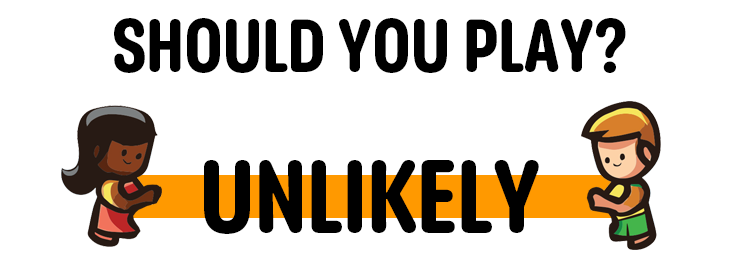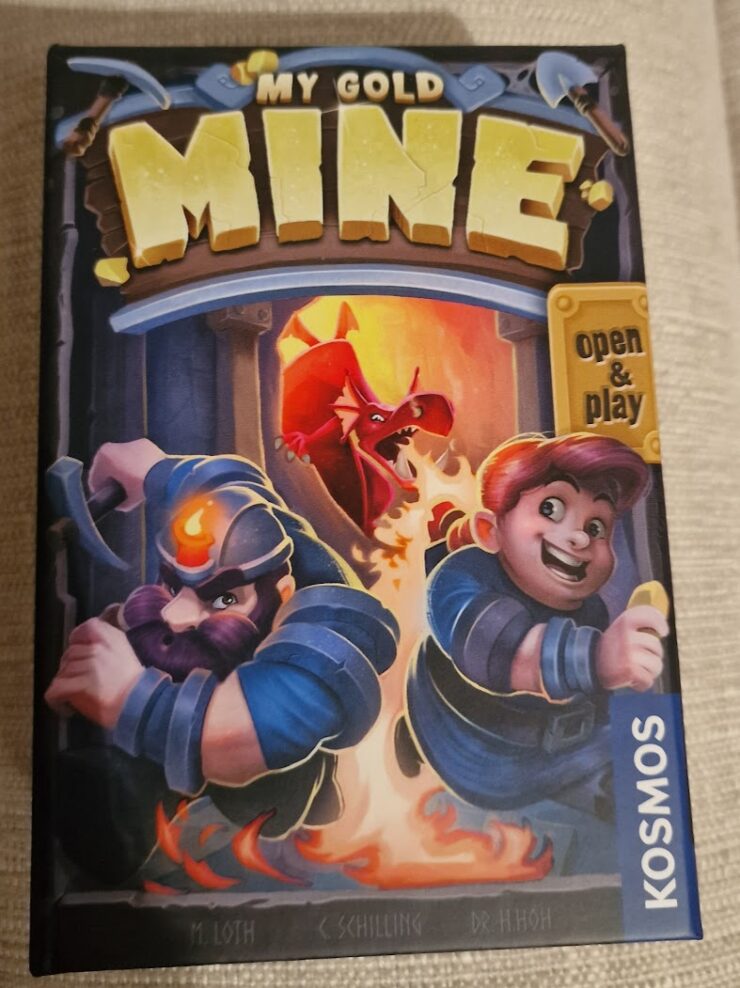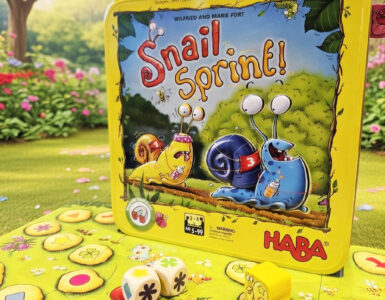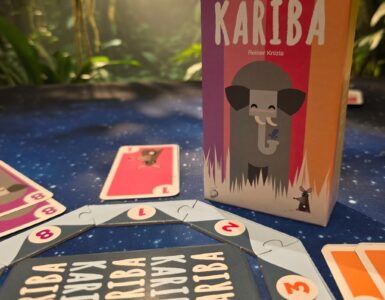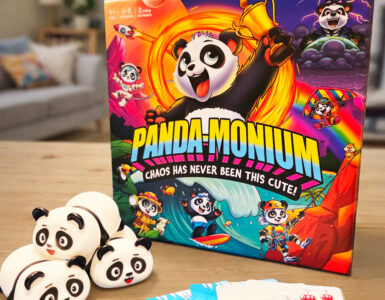Game 30 of the “Bailey Family Summer 2023 Board Game Bonanza” is “My Gold Mine,” played by Toby (5) and myself.
“My Gold Mine” is a travel-sized push-your-luck game, part of Kosmos’s “Open and Play” range (it already had me on the back foot when the “Open & Play” logo is bigger than the “My Gold Mine” logo on side of the box – a poor design decision).
The idea is to try to steal as much treasure from the dragon’s lair. The game consists of three rounds where you are attempting to edge closer to the dragon’s lair to gain as much treasure as possible without encountering the Dragon.
You start by laying out the nine mine tiles with the Dragon at the far right, the entrance at the far left, and the gold cart where your heroes begin in the middle. Each player chooses a miner and receives a matching card for flavour. You shuffle the exploration cards and place them in a face-up stack. Then, you shuffle the exit cards and place them in a face-down stack.
On your turn, you can do two things: draw an exploration card to collect gold or draw an exit card to retreat towards the exit, potentially taking other players with you.
You can always see what type of exploration card you are drawing. They either move you one card closer to the Dragon, gaining you two gold, keep you where you are, gaining you one, or move you closer to the exit, also gaining you one.
The issue is that you don’t know what the next card is going to be, and if you take the gold and draw a dragon, the dragon immediately moves one space to the left, ever closer to the adventurers. Obviously, if the Dragon reaches you, you are eliminated and do not score for that round. What’s quite cool is that sometimes this can trigger a chain reaction where more than one dragon card is next to each other, and all of a sudden, the dragon has moved quite a lot.
If you choose to draw an exit card, this can move you either one or two steps towards the exit. Sometimes it can move everyone as a group, or there is a fairly evil card that lets you swap your player with another player, potentially putting someone else in the path of danger. There is also an extra gold card that grants the extra player three gold, and as we’ve played, we found this three gold to be fairly powerful.
You can exit whenever you want, but if you exit, you no longer continue to gain gold. At the end of the round, the person with the most gold gains three nuggets from the score pile, the second person two, and the third person one. Once you have completed three rounds, you essentially add up the score of the third and final round and add the gold nuggets you won in the previous two rounds to that score. I really didn’t like this mechanic, as it essentially negated most of the first two rounds. The scores tended to be quite high, and even if you’re going into the last round with a maximum 3 gold advantage over the person in second place, this was fairly insignificant as the other player just getting the three gold exit card nullified this.
We played this game three times, and neither I nor the boys liked it that much. Apart from the fact that I don’t like how the third round is essentially all that matters, there are other issues. The exit deck is not that big, and even after just two goes, we had already pretty much worked out what cards are in the deck and therefore had a good idea of what was coming up. There was only one three-gold card in the deck, and this actually has a fairly strong impact. I understand why the cards are face up so that you can make a decision on what you are potentially going to get, but the issue with this is that as they are shiny cards, the slight knocking when you pick up a card can reveal there being potentially a dragon hidden behind the next card in the deck, completely ruining any kind of strategy or surprise. Obviously, when playing this with kids, this is going to happen all the time, but even when I was picking up the cards as carefully as I could, the cards naturally got knocked. Had these cards had a linen finish, this would have been much better.
I also was not keen on the miner discs and would have much-preferred meeples. I always have an issue with any game that involves sticking stickers on wooden discs, as they invariably don’t stick very well, and over time, they begin to look tatty and a bit shabby very quickly. Even in the three games we played, I found myself pressing down some of the stickers regularly. The gold nuggets are fine, but it seemed really weird in the first two rounds to pick up gold and then also get awarded gold for how much gold you got. This clearly should have been a different currency as it’s fairly confusing and doesn’t work thematically.
The box it comes in is nice and solid, and it doesn’t take up much space, which is a positive that it does have going for it. Equally the artwork is really nice and the dragon tiles being flipped and the dragon moving forward looks cool.
It’s a fairly quick game to play, only taking about 20 minutes once you know what you’re doing. However, none of us specifically enjoyed it. In my opinion, there are much better push-your-luck games, and because you are only doing one thing per turn, as opposed to pushing your luck completely on your turn, it takes away some of that “hit me” style of pushing that you would see in a casino, which, in my mind, is what gives a push-your-luck game its appeal.
Better examples are “Stomp the Plank” as something for young kids. “Zombie Dice” is also really good if you can ignore the scary artwork on the box (none of the dice are scary) and “Quacks of Quedlinburg” for slightly older kids (which is one of my favourite games of all time).
In conclusion, there was a lot we weren’t keen on here, combined with issues with the components and the fact that turns also go on for way too long for this type of genre, meaning “My Gold Mine” is definitely not a recommendation from me.
